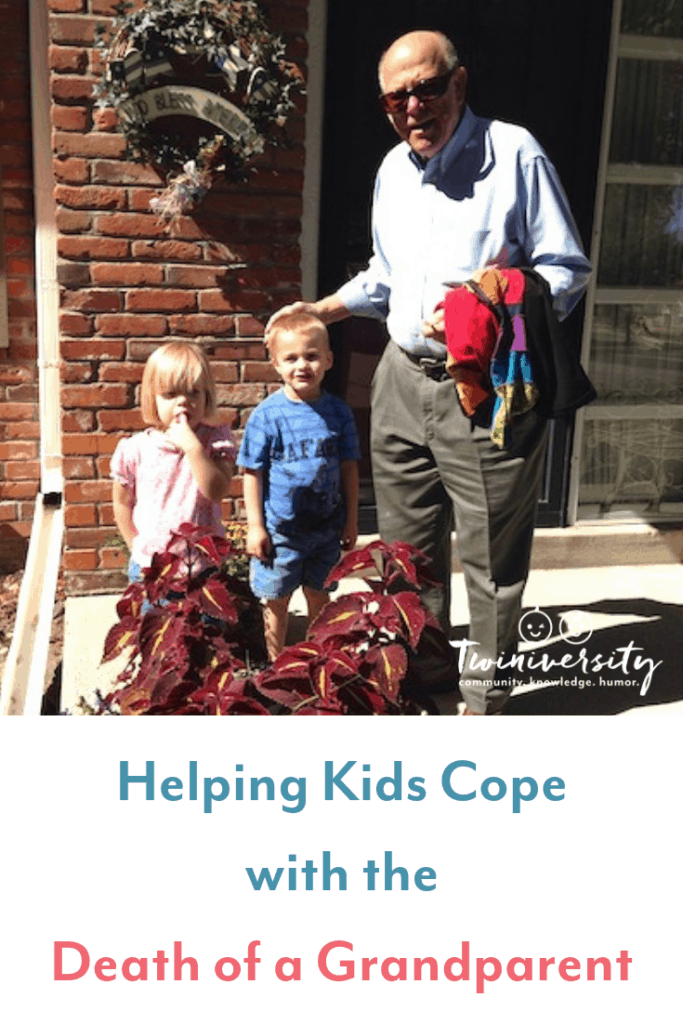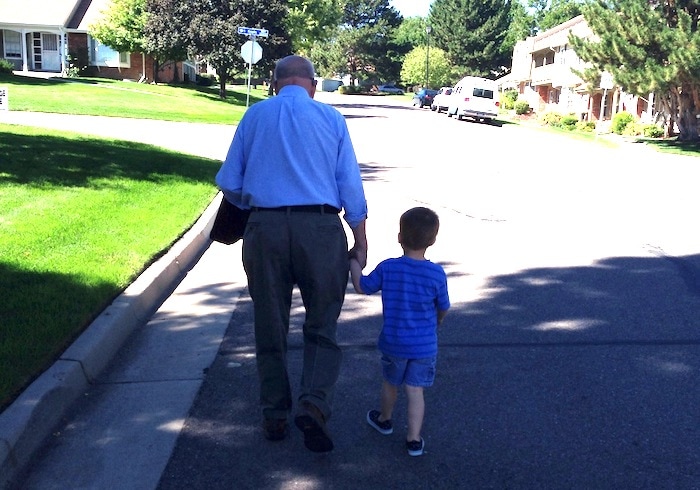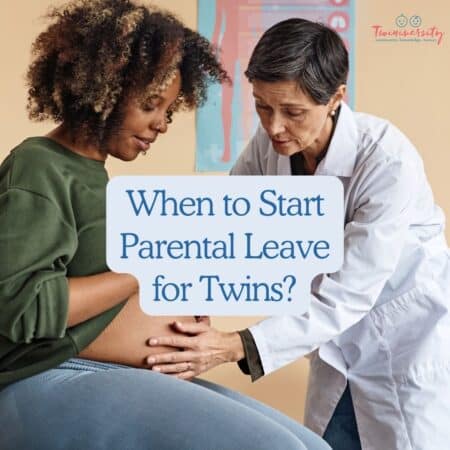Last updated on May 21st, 2024 at 12:18 pm
My father in law died last week. It was not unexpected. The whole family was well prepared for his death. He had been sick for years with both Alzheimer’s and Parkinson’s disease. In the end, we all have to deal with death. It comes to us all as the saying goes. However this time it was different. My husband and I not only had our grief to deal with but the grief of two very different 8-year-old twins.
Ten or so years ago when we started trying to get pregnant we knew that there was a very real possibility that whatever children we had would not get to know their grandfather very well. When they were born my father in law didn’t want to get too attached to them either, fearing that he would hurt them when he died. He knew them for eight and a half years.
While I have no guarantee about how much they will remember of him when they are old I am heartened to know they will remember they did have a grandfather. He was their only one, he will be their only memory. I am familiar with those faded memories. My father died when I was 12.
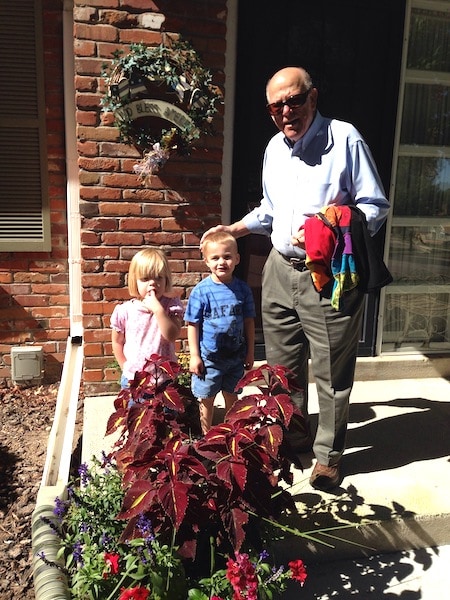
Grief is hard for everyone, it can be especially hard for children. We had no idea how they would react to the situation, so we fell into a comfortable pattern for the last few weeks of him in the hospital. They would come home, we would update them and let them ask the questions they wanted to ask. When the time was coming we were clear with them and open about what was going on. We offered them the chance, every chance we had to go and visit their grandfather. He was not vocal anymore, but he recognized their voices and knew they were there. The wonderful thing was that they got to see their family supporting their dying family member. They were in the room with us as we held his hand and talked to him. They joked with us and laughed as we told stories about his life. It was good for them. I am glad for that. I think our fear of death as a country is often unfounded. We should support our family members as they leave the world, just as we support when new life comes into the world.
When the day finally came and we knew he had hours left we asked them if they wanted to be with him and they choose not too. That was OK. For me, I knew at that moment my focus had to switch from my own grief to shielding them and supporting them through the death of their only grandfather. My son cried, long and hard. My daughter had little reaction. Grief can go through all the extremes for everyone. All reactions are ok. Your job as a parent is to try to support all those variations in moods. We can laugh, cry, be angry and all the emotions in between. There is no wrong way to grieve.
When we had all calmed down the question and answer sessions continued. They had questions about his body, what it means to die, what the funeral would be like. We discussed it all. The kids’ grandmother is a devout Catholic, so the services were going to be extensive. We felt we had to prepare them for what would happen as well as what might happen. We also discussed behavior expectation and what was appropriate for all the services. You cannot expect children to know to act for a funeral.
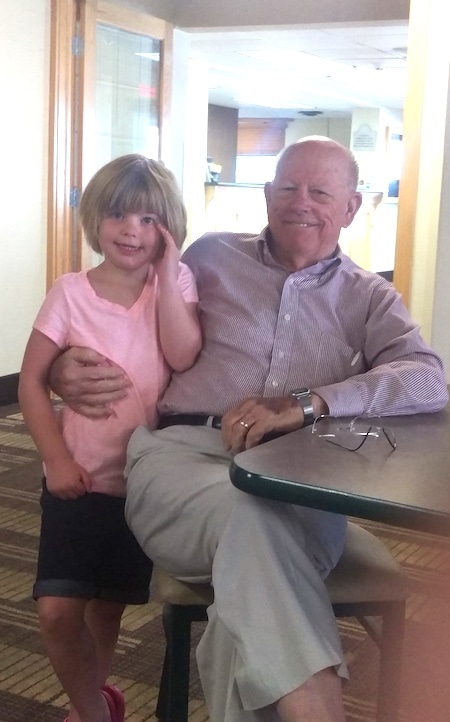
The first was a vigil that was open casket. Everyone had a rough time with that service. Finally, my daughter broke down after when they took her grandfather away in the hearse. The next day and the funeral were easier. The funeral was familiar, with a mass. The twins had more questions. We continued to answer them all. They loved all the people who came to the reception after. There were stories and laughter. We told them that Grandpa had transformed into stories. They happily added their stories of him to the collective memory.
It has been two weeks now since the final service. We are all tired but relieved. In truth, my children surprised me with their strength and curiosity. Every family will have to deal with the death of a family member at some point. I think that as we do we need to keep the youngest family members in mind. As a child when my father died I remember very clearly being confused about everything. I knew my father had died but I had so many questions about what was going on. I wanted to know what happened to him and what would happen to him. However, my mother did not answer my questions. The family around me ignored me as the youngest of the tribe. As an adult, this experience left me afraid of death and sickness. I remember clearly walking into the funeral home to view my father’s body. My mother hadn’t told me what we were doing. I was afraid and sad and angry that I hadn’t been given a choice. Give your children the choice to work through their grief in their own way. There is no wrong way to grieve.
How does your family deal with death? Have you had a death in the family that you have had to walk your children through? What tips can you give other families about what worked for you?

Katie Sutton works in the IT field and is the proud mom of nearly four year old boy/girl twins. She lives in Denver Colorado with her husband, her kids, two cats and one dog. She enjoys writing, reading and travel, all of course when the twins allow. She hopes her articles will give inspiration and a glimpse into her crazy world. She thinks life is full of new wonderful experiences at all turns and she cannot wait to live that life to the fullest.
For Further Resources on Handling Grief With Children You Can Check out These Links:
- KidsHealth.com: Helping Your Child Deal with Death
- PsychologyToday.com: How to Help Your Children Deal with Loss
Related Articles
- Handling the Death of a Loved One With Your Kids
- Why You Need a Death Plan: A Perspective from a Mother of Twins and Attorney
